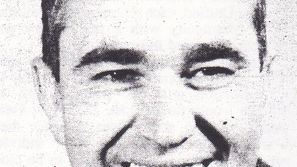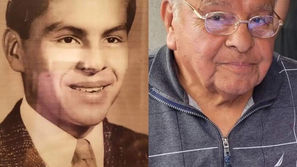Mordecai just missed the killing
- Bill Coate
- Oct 14, 2020
- 4 min read

Madera County Historical Society
George W. Mordecai, 1873.
George Washington Mordecai had every right to be a little nervous on May 16, 1870. He had only been living in the Alabama Settlement on Cottonwood Creek two years when he decided to take a ride to familiarize himself with the countryside. By the early afternoon he had reached the little copper mining town of Buchanan and decided to take a rest and have a drink.
While he was sitting at the table, he decided to write his favorite Aunt Emma a letter. Near the top of the paper he scribbled, “This place is a mining camp: a few houses, stores, a saloon, etc., in the latter of which I am writing at a card table with a Colt pistol by me, while at another table a few feet distant sits a party of grizzly Californians taking a little game, so if you find any mistakes in this, you must lay it to the extreme state of terror which follows as a necessary consequence of the surroundings.”
Mordecai’s perceptions were right on. Buchanan was as rough and tumble as they came in those pioneer days. Three weeks after his visit to Buchanan, one of the ghastliest episodes in Madera County history took place just a few feet from where Mordecai had written his letter.
Buchanan was located along what is now a winding dirt road (county road 607). Nearby were the Buchanan copper mines, which not only sustained the town, but gave it the stamp of the wild west as well. Grizzled miners, as Mordecai called them, flocked in from all over to crawl into the shafts that still dot the hillsides, and by the 1870’s, it was a beehive of activity of 1500 people.
Like all mining towns, Buchanan had its stores, a saloon, a post office, and a school. It also had its troublemakers.
Louis Roberti and Bob Fraser both worked in the copper mines. Roberti boarded with John Brown, who owned one of the town’s general merchandise stores, while Fraser lived with a Mr. Smith. There is no indication that there had been any bad blood between the two before that fateful night of June 8, 1870.
The trouble started at the very saloon in which Mordecai had written his letter. After several rounds at the “well,” Roberti and Fraser began to quarrel over something. Soon angry words led to pushing and shoving, which led the bystanders to insist that the two men take their disagreement out into the street, which they promptly did.
Roberti went out the door first, empty-handed. Fraser, however, grabbed a shotgun as he departed, and when the antagonists met on the street, Roberti was at a distinct disadvantage. While he picked up a rock to try to defend himself, someone grabbed the gun away from Fraser and set it on the saloon steps. At that point, Roberti charged his nemesis with the rock, so Fraser made a beeline for the porch to retrieve his shotgun. Once more the crowd disarmed Fraser and then convinced him to go to bed, which advice he took, but not before Roberti taunted him for being a coward.
The next morning Fraser awoke with a headache and a thirst for revenge. He had been humiliated before the whole town; therefore, his honor had to be satisfied.
Since it was Sunday morning, Fraser reasoned that Roberti would still be at his residence, so he went into the kitchen and found a huge butcher knife, which he secreted in his belt. Then he went outside, got two empty buckets and headed up the street as if he were going for water. He knew he had to pass Roberti’s place of abode on the way.
Sure enough, as Fraser passed the Brown home, there was Roberti out on the front porch in a rocking chair. When the latter spied his opponent coming up the street, he decided to pick up where he had left off the night before. Out into the street he stepped, right in Fraser’s path, and there he began to renew the taunts he had thrown at him earlier. This time, however, there were no bystanders to save him, and Fraser had no gun.
When Roberti came to within spitting distance of Fraser, he set his buckets down and pulled out his knife. As quickly as lightening, Fraser plunged the blade into Roberti’s navel and then brought it a quarter of the way around his body, much as one would peel an orange. Of course Roberti dropped to the ground, losing much blood and a measure of intestines protruding from the wound.
Fraser was almost immediately arrested by Leroy Dennis, the Buchanan constable and taken to jail in Millerton. Roberti was taken inside the house, and Dr. C. E. Brown was called, but in a very short time, he was dead.
They buried Roberti not far from the Buchanan school house, since that is where religious services were held, and life in the “Copperopolis” of Madera County resumed its frontier existence, minus the Italian and his assailant.
Pride, however, lived on, just as it did everywhere in the wild and wooly West. The affray between Roberti and Fraser wasn’t the first that the town of Buchanan had witnessed, and it certainly wouldn’t be the last. Honor had to be preserved at all costs, but Mordecai knew all about that.


























Comments